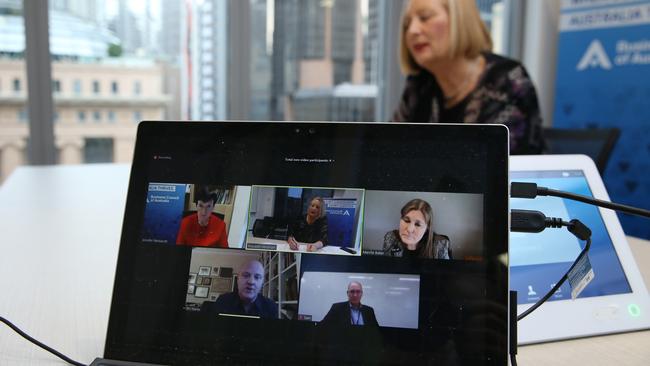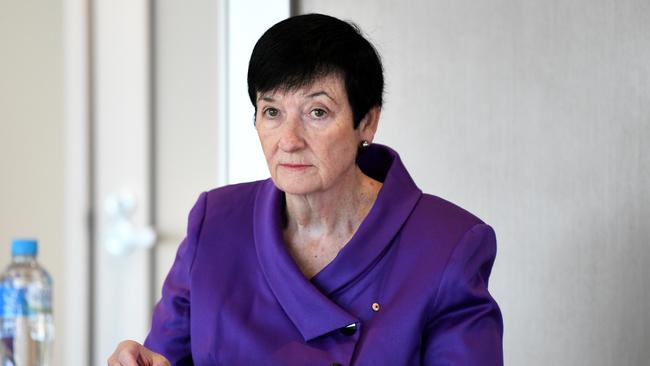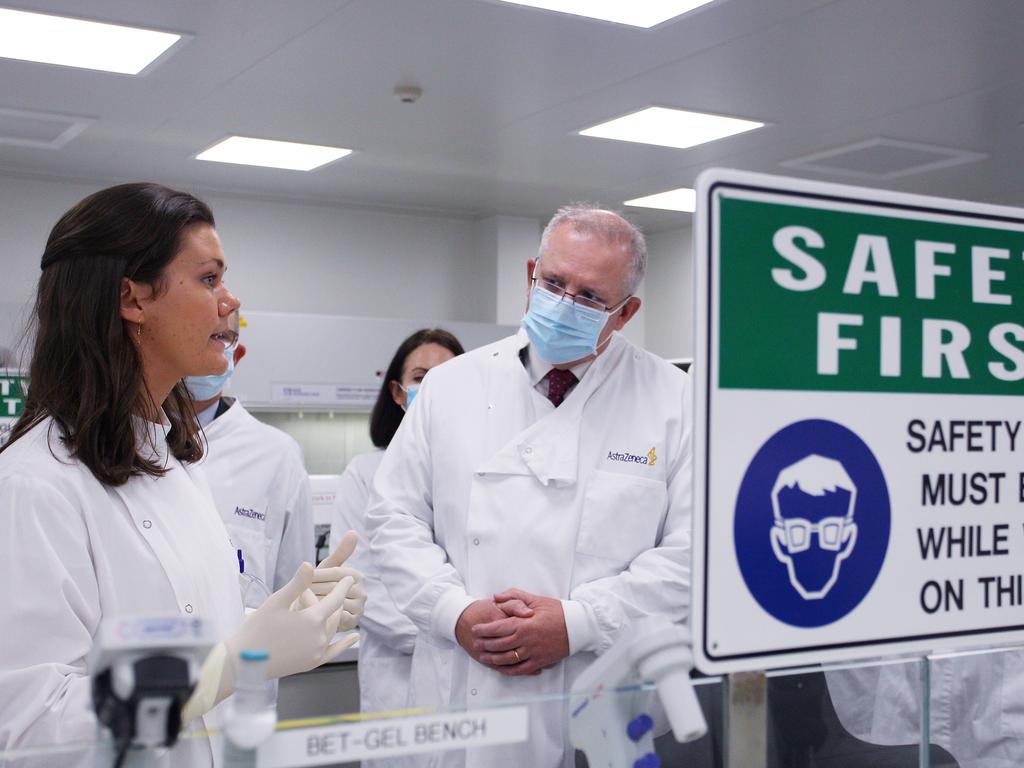‘Spend more on the regions to kick-start Australian economy’
Business leaders said investments in critical regional infrastructure could help open up regional economies.

Governments have been urged to boost spending on regional infrastructure, open up more regional areas and restrict COVID-19 shutdowns to more localised areas to help kick-start the economy.
In a roundtable hosted by the Business Council of Australia and The Australian, business leaders said investments in critical regional infrastructure could play a major difference in opening up regional economies.
The comments come as the Reserve Bank governor Philip Lowe called on the states and territory leaders to lift their spending over the next two years by $40bn — or 2 per cent of GDP — to help create jobs and carry their share of the fiscal burden.
Speaking after the national cabinet meeting on Friday, Prime Minister Scott Morrison said infrastructure spending would be critical as part of government’s moves to create more jobs in the wake of the COVID-19 pandemic.
Speaking at the roundtable, Bendigo & Adelaide Bank CEO Marnie Baker said there were many projects in regional Australia that could be “up and running in three months” which could help boost the economy in regional areas around Australia.
One of these was the Hells Gates dam project in northern Queensland near Townsville.
“We should be fast-tracking the assessment around the Hells Gates dam there,” she said.
“It’s actually going to open up the surrounding basin area to projects like the Townsville Airport actually progressing.”
The chief operating officer of online jobs company Seek and former Commonwealth Bank CEO Ian Narev said more work needed to be done to reduce “friction” in the labour force, “to effectively match jobs with the people who need the jobs”.
BCA chief executive Jennifer Westacott said getting projects started in regional areas would have a significant effect on boosting jobs in the areas.
“Getting a project started in a region starts to accelerate — a lot of the supply chain starts getting mobilised,” she said.
“Suddenly a whole lot of engineering services start doing work on the planning.
“A lot of people start relocating, thinking the project is going ahead. There’s always a tremendous amount of upfront activity that happens when you bring forward some of these big projects.
Get started
“We should just get started on some stuff.”
Other potential regional infrastructure projects mentioned by the BCA include an improved road cross in Cairns to open up the Atherton Tablelands and the upgrade of the Busselton Airport terminal in Western Australia.
Ms Baker said it was important that governments started looking at opening up some regional areas to help create jobs and boost local economies.
“There’s a lot of regional areas in Australia which have had no cases of COVID at all,” she said.
“Opening up some of those regions earlier is going to ensure that we are acting quickly to ensure that our recovery is as good as we hope it can be.”
She said there was strong potential for domestic tourism to regional areas of Australia at a time when international tourism was banned.
“With international border restrictions and other border restrictions, progressively relaxing domestic border restrictions opens up opportunities for people to be spending more time in regional Australia.”
“We want to be promoting regional getaways,” she said.
She said more work needed to be done to encourage more industries to move to regional areas.
“There’s a lot of innovation which comes out of regional areas,” she said.
She said ta company in Ballarat that produced mining equipment which had turned to making ventilators for hospitals, and a gin distillery in Shepparton was now making hand sanitisers.
Meanwhile, Ms Westacott told the roundtable that more focus was needed on controlling COVID outbreaks locally.
“We can’t stop and start the economy,” she said.
“We have to get the health system ready and make sure we are protecting vulnerable people.
Right ingredients
“We’ve got the right ingredients to really get cracking as a country, we’ve just got to mix it up in the right way.”
Business leaders at the roundtable also called for targeted policies to encourage the development of regional Australia and said the time was right to develop a 10-year strategy for manufacturing.
“COVID highlights the inherent risk of having 40 per cent of your population in two capital cities,” Ms Baker said.
“Rapid regionalisation is something that can really kick-start the economy.
“You’ve got the majority of your small to medium businesses and your agribusinesses all located in regional Australia.
“If we kickstart those and add to the businesses operating out of regional Australia, it’s going to give a good boost to the economy.”
Mr Narev said there needed to be a ‘‘Team Australia’’ approach to pushing ahead with new policies including co-operation between government and business and between levels of government.
“We need to really focus on eliminating friction from the labour market,” he said.
“One part of the solution is to create more jobs. That’s great.
“But equally important is to match the jobs with the people.”
“There is an immediate opportunity in having all the data and having the private and the public sector working together on the problem to take the friction out of the system,” he said.
The BCA is arguing for more analysis of jobs data to determine the skills needed by employers in the current market.

It is also arguing for practical policies such as bringing together online government job sites into one site to make it easier for job seekers to find out the full range of government jobs available.
“Governments could consolidate their existing jobs portals and collate information in one location which lets people more easily find out what jobs are being analysed,” Mr Narev said.
He said there was room for governments to co operate with private sector online job sites to make government job sites more user-friendly and easier for job seekers to understand what jobs they could get with their current skills or what jobs they could get with new skills.
He said there should be closer links between government incentives on training and the skills needed by employers.
“If you get the private sector and the public sector working together around the individual and around the skills path, and building on the signals from the job market, you start to get the friction out of the system.”
GE Australia CEO Sam Maresh said Australia needed a 10-year plan to encourage manufacturing, including investment allowances, research and development incentives and a skills program.
Co-operation needed
He said this needed co-operation between federal and state governments.
He said the medical technology sector was well supported, with the Medical Research Future Fund and engagement between the research and university sector.
“We need something very similar for the manufacturing sector so it can have the same long-term certainty and a policy framework which allowed people to invest with confidence.”
“There’s no time to waste to get these things done,” Ms Westacott said.
“There is a big temptation to say: ‘let’s wait until the health stuff is completely under control’.”
But Ms Westacott said many other countries around the world were also working on policies to boost their economies as they came out of the pandemic.
“Of course we have to manage the health stuff — no one is questioning that — but around the world, many other countries are having the same conversation.
“How do we get our products to market? How do we get our people better skilled? How do we get our system to be more competitive?”
“The idea that Australia, which has enjoyed incredible success for 30 years, is the only country in the world sitting around working out how they can get out of this pandemic is naive.
“We need to give ourselves an accelerated edge so that we can come out of this with another 30 years of wages growth,” she said.








To join the conversation, please log in. Don't have an account? Register
Join the conversation, you are commenting as Logout